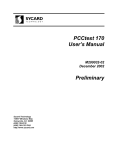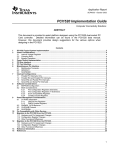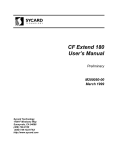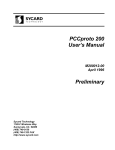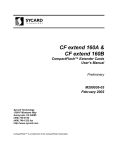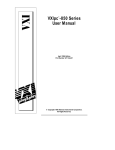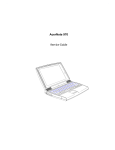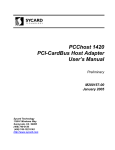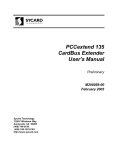Download C A T A L O G - Sycard Technology
Transcript
C Sycard Technology Product Catalog Table of contents 16-bit PC Card Development Tools Extender Cards/Socket Savers 16-bit PC Card Prototype Boards 16-bit PC Card Test Tools Manufacturing PC Card Socket Testers Engineering PC Card Socket Testers CardBus Development Tools CardBus Extenders/Socket Savers CardBus Test Tools CardBus Socket Testers Engineering Test Tools CompactFlash™ Development Products CompactFlash™ Extender Cards CompactFlash™Test Tools PCI Products Extender Cards Secure Digital Products SmartMedia™ Products Software Products 5 5 7 2 2 3 11 11 8 8 9 15 15 19 21 21 23 20 22 A T A L O G Sycard Technology 1180-F Miraloma Way Sunnyvale, CA 94085 408-749-0130 tel 408-749-1323 fax http://www.sycard.com Sycard Technology Product Catalog 16-bit PC Card Test Tools 16-bit PC Card Test Tools Manufacturing PC Card Socket Testers PCCtest 170 PCCtest Card Low Cost 16-bit PC Card Socket Tester (3.3 & 5 volt) The PCCtest 170 is part of a new family of low cost 16-bit PC Card socket testers. Based on the highly successful PCCtest 2xx series of socket testers, the PCCtest 170 is a cost reduced version designed to provide similar test coverage at a significant price reduction. The new socket tester provides a quick and easy way of verifying the operation of a host socket. Housed in a Type II PC Card, the PCCtest includes software to test a wide variety of socket controllers from Texas Instruments, Cirrus Logic, Vadem, Ricoh and O2 Micro. The PCCtest socket tester verifies all signals on the 16-bit PC Card interface including accurate Vcc and Vpp measurements. Manufacturers, service centers and developers of PC Card products can benefit from the quick verification of their PC Card hosts. How many times have you wondered if the problem you were having was hardware, software or both? A 15-second test by the PCCtest can save hours of debug work by validating the hardware portion of the 16-bit PC Card interface. Sycard Technology offers the PCCtest 170 with a “canned” application software designed to test common socket controllers under MSDOS. For developers of embedded systems or those who wish to develop their own software, Sycard offers a developer’s kit with sample source code and technical documentation. PCCtest 250 The following Sycard test card models are for manufacturing purposes: PCCtest 170 PCCtest 250/350 PCCtest 270/273 16-bit PC Card Socket Tester for 5.0 Volt Systems The PCCtest 250 socket tester provides a quick and easy way of verifying the operation of a host socket. Housed in a Type II PC Card, the PCCtest includes software to test a wide variety of socket controllers from Intel, Cirrus Logic, Vadem, Ricoh, Omega Micro and VLSI Technology. The PCCtest socket tester verifies all signals on the 16-bit PC Card interface including accurate Vcc and Vpp measurements. Manufacturers, service centers and developers of PC Card products can benefit from the quick verification of their PC Card hosts. How many times have you wondered if the problem you were having were hardware, software or both? A 15-second test by the PCCtest can save hours of debug work by validating the hardware portion of the 16-bitt PC Card interface. Some of our customers of the PCCtest product were able to find design errors in products they already had in production. The PCCtest 250 is designed to test products based on the original PCMCIA 2.1 release. The PCCtest verifies all data, address and strobe signals at 5.0 volts. The PCCtest 250 is best suited for the following PC Card controllers: Cirrus Logic CL/PD6710 Cirrus Logic CL/PD6720 Intel 82365SL Vadem VG-365 Vadem VG-465 Vadem VG-468 VLSI 82C146 And any other 5V only 16-bit PC Card implementation 2 Sycard Technology Product Catalog 16-bit PC Card Test Tools PCCtest 270/273 16-bit PC Card Socket Tester with 3.3V and DMA Support The PCCtest 270 and 273 socket testers provides a quick and easy way of verifying the operation of a host socket. Housed in a Type II PC Card, the PCCtest includes software to test a wide variety of socket controllers from TI, Cirrus Logic, Vadem, Ricoh, Omega Micro and VLSI Technology. The PCCtest socket tester verifies all signals on the 16-bit PC Card interface including accurate Vcc and Vpp measurements. Manufacturers, service centers and developers of PC Card products can benefit from the quick verification of their 16-bit PC Card hosts. How many times have you wondered if the problem you were having was hardware, software or both? A 15-second test by the PCCtest can save hours of debug work by validating the hardware portion of the 16-bit PC Card interface. Some of our PCCtest customers were able to find design errors in products they already had in production. The PCCtest 270/273 supports testing of Direct Memory Access (DMA), 3.3V and Voltage Sense pins (VS1 and VS2) as defined in the PC Card ‘95 Standard. The PCCtest 270/273 verifies all data, address and strobe signals at 3.3 or 5.0 volts. The PCCtest 273 is a special version of the PCCtest 270 that internally grounds CD1- and CD2- for socket controllers that require active card detects prior to slot power-up. All CardBus controllers require that card detects be grounded prior to slot power-up. The PCCtest 270 is best suited for the following 16-bit PC Card controllers: Cirrus Logic CL/PD6722 Omega/Trident 82C722 Cirrus Logic CL/PD6729 Omega/Trident 82C094 Cirrus Logic CL/PD6730 Ricoh RL5C266/366 Intel 82365SL-DF Ricoh RL5C296/396 Intel 82092AA (PPEC) VLSI 82C146A The PCCtest 273 is best suited for the following 16-bit PC Card controllers: Cirrus Logic CL/PD6832 (16-bit only) Vadem VG-469 All Texas Instrument 16-bit PC Card Controllers All O2 Micro 16-bit PC Card Controllers All CardBus controllers Any other controllers that require card detects active prior to power-up Engineering PC Card Socket Testers PCCtest 350 The following Sycard test card models are for engineering purposes: PCCtest 350 PCCtest 370/373 16-bit PC Card Socket Tester for 5 Volt Systems The PCCtest 350 socket tester provides a quick and easy way of verifying the operation of a host socket. Housed in a Type II PC Card, the PCCtest includes software to test a wide variety of socket controllers from Intel, Cirrus Logic, Vadem, Ricoh, Omega Micro and VLSI Technology. The PCCtest socket tester verifies all signals on the 16-bit PC Card interface including accurate Vcc and Vpp measurements. Manufacturers, service centers and developers of PC Card products can benefit from the quick verification of their 16-bit PC Card hosts. How many times have you wondered if the problem you were having was hardware, software or both? A 15-second test by the PCCtest can save hours of debug work by validating the hardware portion of the 16-bit PC Card interface. Some of our PCCtest customers were able to find design errors in products they already had in production. The PCCtest 350 extends the capabilities of the PCCtest 250 by adding a serial interface for “backdoor” debugging of the PC Card interface. If the socket appears completely “dead”, the user can debug by accessing the PCCtest’s internal registers. Data, address and strobe signals may be monitored or asserted. The PCCtest 350 is perfect for bringing up a PC Card host design. The RS232 serial interface can connect to the host machine or a dumb terminal. 3 Sycard Technology Product Catalog 16-bit PC Card Test Tools The PCCtest 350 is designed to test products based on the original PCMCIA 2.1 release. The tester verifies all data, address and strobe signals at 5.0 volts. The PCCtest 350 is best suited for the following PC Card controllers: Cirrus Logic CL/PD6710 Cirrus Logic CL/PD6720 Intel 82365SL Vadem VG-365 Vadem VG-465 Vadem VG-468 VLSI 82C146 And any other 5V only 16-bit PC Card implementation PCCtest 370/373 16-bit PC Card Socket Testers with 3.3 Volt and DMA Support The PCCtest 370 and 373 socket testers provides a quick and easy way of verifying the operation of a host socket. Housed in a Type II PC Card, the PCCtest includes software to test a wide variety of socket controllers from TI, Cirrus Logic, Vadem, Ricoh, Omega Micro and VLSI Technology. The PCCtest socket tester verifies all signals on the 16-bit PC Card interface including accurate Vcc and Vpp measurements. Manufacturers, service centers and developers of PC Card products can benefit from the quick verification of their 16-bit PC Card hosts. How many times have you wondered if the problem you were having was hardware, software or both? A 15-second test by the PCCtest can save hours of debug work by validating the hardware portion of the 16-bit PC Card interface. Some of our PCCtest customers were able to find design errors in products they already had in production. The PCCtest 370/373 supports testing of Direct Memory Access (DMA), 3.3V and Voltage Sense pins (VS1 and VS2) as defined in the PC Card ‘95 Standard. The PCCtest 370/373 verifies all data, address and strobe signals at 3.3 or 5.0 volts. The PCCtest 370 and 373 extends the capabilities of the PCCtest 270/273 series by adding a serial interface for “backdoor” debugging of the PC Card interface. If the socket appears completely “dead”, the user can debug by accessing the PCCtest’s internal registers. Data, address and strobe signals may be monitored or asserted. The 37x series is perfect for bringing up a PC Card host design. The RS-232 serial interface can connect to the host machine or a dumb terminal. The PCCtest 373 is a special version of the PCCtest 370 that internally grounds CD1- and CD2- for socket controllers that require active card detects prior to slot power-up. All CardBus controllers require that card detects be grounded prior to slot power-up. The PCCtest 370 is best suited for the following PC Card controllers: Cirrus Logic CL/PD6722 Omega/Trident 82C722 Cirrus Logic CL/PD6729 Omega/Trident 82C094 Cirrus Logic CL/PD6730 Ricoh RL5C266/366 Intel 82365SL-DF Ricoh RL5C296/396 Intel 82092AA (PPEC) VLSI 82C146A The PCCtest 373 is best suited for the following PC Card controllers: Cirrus Logic CL/PD6832 (16-bit only) Vadem VG-469 All Texas Instrument PC Card-16 Controllers All O2 Micro Instrument Controllers All CardBus controllers Any other controllers that require card detects active prior to power-up 4 Sycard Technology Product Catalog 16-bit PC Card Development Tools 16-bit PC Card Development Tools Extender Cards/Socket Savers PCCextend 50 Sycard Technology offers several 16-bit PC Card development and prototype tools designed for engineering as well as the manufacturing environments. 16-bit PC Card Socket Saver & Extender In a high volume production environment a PCCtest socket tester may see several thousand insertion/removal cycles a month. To prevent wear and tear on the PCCtest’s 68-pin connector, Sycard supplies a low cost “socket saver”, the PCCextend 50. The unit is inserted between the 16-bit PC Card socket and the PCCtest unit. The PCCextend 50 can also be used as a “Type extender” which allows the user to insert a Type III PC card (10.5mm thick) into a Type I (3.3mm) or Type II (5.0mm)slot. By using the PCCextend 50, Type III peripherals, such as hard disk drives or RF/radio devices, can be inserted into computers that only support Type I or Type II cards. Before attempting to use the PCCextend 50 in such an application, the user should verify if the power consumption of the Type III PC Card is compatible with the host system. PCCextend 100 16-bit PC Card Extender Card The PCCextend 100 is the ultimate in extender cards. It provides developers of 16-bit PC Card hosts and cards a convenient way of accessing signals on the 16-bit PC Card interface. All 68-pins are accessible via standard 0.1” test posts. Multi-layer design with separate ground and power planes assure trouble free operation. All signal pins are clearly marked with both I/O and memory mode designations. Jumper blocks on Vcc and programming power pins allow for easy current measurements. A current protection device protects the host socket. The PCCextend 100 is compatible with all 16-bit PC Card sockets including type I, II III and larger. Dual LEDs indicate if the socket is running at 3.3V or 5V. The PCCextend 100 extender card is a solid unit designed for years of reliable service and is the only extender to offer the PCCswap switch. A quick push on this switch simulates a card removal/insertion cycle saving wear and tear on the 16-bit PC Card socket (and your fingers). PCCextend 120 16-bit PC Card Flexible Extender Card The PCCextend 120 is a flexible extender card designed to provide easy access to a 16-bit PC Card for debug or test. Designed with the same low noise characteristics of our PCCextend 100, the PCCextend 120 takes this design a step further by connecting the host and card via ribbon cables. The flexible extender consists of two PC boards, the host interface board, and the card interface board. The host interface board is inserted into the host’s 16-bit PC Card slot. Four 34-pin ribbon cables connect the host interface board to the card interface board. The PC Card to be tested is inserted into the card interface board’s 68pin connector. The PCCextend 120 was designed with the engineer and technician in mind. Thoughtfully placed grounding posts provided a convenient place to ground a scope probe or analyzer. Vcc test points are available for easy voltage mea5 Sycard Technology Product Catalog 16-bit PC Card Development Tools surements. Dual LEDs indicate if the Vcc is at 3.3V or 5V. A resettable current protection device protects the host from Vcc to ground shorts. Jumpers can isolate Vcc and Vpp supplies for easy current measurements. All too often extender cards are the source of many signal integrity problems. The PCCextend 120 is designed to minimize the signal degradation by using proven design techniques. Separate Vcc and Ground planes provide a low inductance path to the host socket. High frequency X7R and bulk tantalum capacitors keep supply rails clean. The PCCextend 120 uses four 34-pin ribbon cables to connect the host and card interface boards. This insures that each signal has a ground return. The PCCextend 120 comes standard with a 5” extension cable. Although distances greater than a few inches may effect the signal integrity, we have used longer cable lengths successfully in several applications. Sycard Technology offers the PCCextend 120 in several configurations. For those that need a ready made solution, the PCCextend 120 comes with both the host-side and card-side boards along with a 5” extension cable. For those customers that wish to make their own cables, the host and card interface boards can be ordered without cables. The host and card interface boards can also be used individually for special test and development needs. PCCextend 120 HIB 16-bit PC Card Host Interface Board For those applications that require access to the 16-bit PC Card interface that can’t use a standard extender card, Sycard provides the PCCextend 120 HIB (Host Interface Board) which allows full access to all 68-signal and power pins on the PC Card host. Standard 0.1” headers allow the user to connect standard 34-pin ribbon cable to test or prototype hardware. The PCCextend 120HIB is ideal for interfacing a prototype 16-bit PC Card design to the PC Card host socket. The unit is designed to provide a low noise interface to prototype or test hardware. The PCCextend 120HIB is a 6-layer PC board with signal traces surrounded by ground traces and power planes. Four 34-pin headers with alternating grounds insure signal integrity. The PCCextend 120HIB is designed for 16-bit PC Card applications; it’s sister product, the PCCextend 125HIB is designed for 32-bit CardBus applications. The PCCextend 120 can be ordered as follows: Order Number Description PCCextend 120 16-bit PC Card flexible extender card with 5”cable extension (includes one host interface board and one card interface board). 120HIB PCCextend 120 host interface board 120CIB PCCextend 120 card interface board 12XCBL-5 PCCextend 120 5” cable set PCCextend 120CIB 16-bit PC Card Card Interface Board For those applications that require access to the 16-bit PC Card that can’t use a standard extender card, Sycard provides the PCCextend 120CIB (Card Interface Board) which allows full access to all 68signal and power pins on the PC Card peripheral. Standard 0.1” headers allow the user to connect standard 34-pin ribbon cable to test or prototype hardware. The PCCextend 120CIB is ideal for connecting test or development hardware to a 16-bit PC Card. The unit is designed to provide a low noise interface to prototype or test hardware. The PCCextend 120CIB is a 4-layer PC board with power 6 Sycard Technology Product Catalog 16-bit PC Card Development Tools and ground planes. Four 34-pin headers with alternating grounds insure signal integrity. The PCCextend 120CIB is designed for 16-bit PC Card applications; it’s sister product, the PCCextend 125CIB is designed for 32-bit CardBus applications. The PCCextend 120 can be ordered as follows: Order Number Description PCCextend 120 16-bit PC Card flexible extender card with 5”cable extension (includes one host interface board and one card interface board). 120HIB PCCextend 120 host interface board 120CIB PCCextend 120 card interface board 12XCBL-5 PCCextend 120 5” cable set 16-bit PC Card Prototype Boards PCCproto 150 16-bit PC Card General Purpose Prototype Board For designers requiring a general purpose prototype board, Sycard offers the PCCproto 150. The PCCproto 150 is a flexible prototype board designed specifically for 16-bit PC Card designs. Since most PC Card designs are based on low profile, high pin count packages, the PCCproto 150 provides special prototype areas for these devices. These areas accept plug-in “daughter boards” that support a particular package type. The product includes three of these boards supporting 64, 100, 144 and 176pin TQFP and 44, 100 and 160-pin PQFP packages. Additional “daughter boards” may be purchased separately. An area reserved for I/O provides connector locations for straight 0.1” headers and surface mount connectors. The PCCproto 150 is constructed using a multi-layer design with clearly marked signal names and pin numbers. PCCproto 200 Multifunction 16-bit PC Card Prototype Board In conjunction with National Semiconductor, Sycard Technology offers the PCCproto 200 16-bit PC Card multifunction prototype board. The PCCproto 200 provides a flexible prototype environment for developing 16-bit single or multiple function PC Cards. Based on the National Semiconductor PCM16C02 multiple function PC Card interface chip, the PCCproto 200 includes data sheets and application notes. The PCCproto 200 consists of the PCCproto 150 unit and a plug-in daughter board that contains the PCM16C02 and associated circuitry. The PCCproto 150 is a flexible prototype board designed specifically for 16-bit PC Card designs. Since most PC Card designs are based on low profile, high pin count packages, the PCCproto provides special prototype areas for these devices. These areas accept plug-in “daughter boards” that support a particular package type. The PCCproto 200 includes three of these boards supporting 64, 100, 144 and 176 pin TQFP and 44, 100 and 160 pin PQFP packages. Additional “daughter boards” may be purchased separately. An area reserved for I/O provides connector locations for straight 0.1” headers and surface mount connectors. The PCCproto is constructed using a multi-layer design with clearly marked signal names and pin numbers. To speed up software development, a sample PC Card client framework is included. The client framework provides the designer with sample source code for a PC Card ‘95 compliant client driver. 7 Sycard Technology Product Catalog CardBus Test Tools CardBus Test Tools CardBus Socket Testers PCCtest 460 CardBus Socket Tester The PCCtest 460 is designed to test the full functionality of the PC Card/ CardBus interface. Since the 1995 and subsequent releases of the PC Card Standard, the number of different cards that can be supported in a single machine has drastically increased. It is not uncommon for a PC Card slot to support 32-bit CardBus, 16-bit PC Card, Zoomed Video, 5V and 3.3V cards. Testing this slot involves inserting as many as 3-4 cards to verify full functionality. The PCCtest 460 is the only test card designed to emulate all types of cards in a single unit. Housed in a type II card, the PCCtest 460 can test the 32-bit CardBus, 16-bit PC Card and the Zoomed Video interfaces. In CardBus mode, the PCCtest 460 is capable of responding to target memory, I/O and configuration cycles. Master mode I/O and memory cycles can be generated under program control. Control, Address and Data signals can be latched to verify correct access. In 16-bit mode, the PCCtest 460 can verify all address, data, control and status signals. 16-bit testing is supported at 3.3V and 5V. From 16-bit mode, the PCCtest can be configured for Zoomed Video(ZV) operation. In ZV mode, the PCCtest will generate a ZV data pattern designed to verify the ZV bus. An audio test pattern is generated simultaneously to verify the ZV audio signals. Selection of CardBus or 16-bit interface is accomplished through an external configuration header. This header plugs into the PCCtest’s 15-pin I/O connector. An optional external configuration unit, the PCCtest 455, provides for program control of 16-bit, Zoomed Video or CardBus interface. PCCtest 460 Optional Accessories PCCtest 457 Switchable Configuration Header The PCCtest 457 switchable configuration header simplifies switching between 16-bit PC Card mode and CardBus mode. Instead of separate 16-bit PC Card and CardBus configuration headers, the PCCtest 457’s slide switch can put the PCCtest 460 into either mode. PCCtest 455 External Control Unit The PCCtest 455 external control unit in conjunction with the PCCtest 460, is designed to automate testing of the PC Card slot. The PCCtest 455 controls the configuration of the PCCtest 460 Card Detects and Voltage Sense pins. Through program control, the PCCtest 455 can configure the PC Card interface for CardBus, 3.3V 16-bit, 5V 16-bit and others. The PCCtest 455 connects between the host PC’s parallel port and the PCCtest 460’s 15-pin I/O interface. Software support for the PCCtest 455 is included in the PCCtest 460 software. The PCCtest 460 can be ordered as follows: Order Number PCCtest 460 PCCtest 460-01 PCCtest 455 PCCtest 457 Description CardBus socket tester with 16-bit PC Card configuration header and CardBus configuration header CardBus socket tester with PCCtest 457 switchable configuration header External Control Unit Switchable configuration header 8 Sycard Technology Product Catalog CardBus Test Tools Engineering Test Tools PCCtest 560 CardBus Socket Tester/Debugger The PCCtest 560 extends the functionality of the PCCtest 450/460 by adding a serial debug port. The serial debug port allows the user to monitor the CardBus or 16-bit interface. In CardBus mode the PCCtest 560 is capable of initiating I/O and memory transactions. It can also monitor the CardBus interface for any type of cycle. The serial interface is useful for debugging a new design or for component level debug. The PCCtest 560 includes an external control unit (PCCtest 551) that provides the features of the PCCtest 455 with the addition of a serial port connector. � � � �� � ��� � � � � � � � � � � �� � � � � � � �� � � �� � � � � � �� � � �� � � � � � � � � � � � � �� � � � � �� � � � � � � � � � � � �� � ��� � � � � � � �� � � � � � � � � � � � � � �� � � � � �� � � � � � � � � 9 Sycard Technology Product Catalog CardBus Development Tools CardBus Development Tools PCChost 1420 Sycard Technology offers several products for CardBus host and card development. Our tools are designed for engineering as well as manufacturing environments. PCI-to-CardBus Bridge Based on Texas Instruments’ PCI1420 CardBus host adapter chip, the PCChost 1420 PCI-to-CardBus bridge provides the engineer with a platform to evaluate a high performance ACPI compliant CardBus bridge device. Contained on a single Peripheral Component Interconnect (PCI) bus card, the PCChost 1420 is compatible with a wide variety of PC and non-PC PCI hosts. TI’s PCI1420 is part of their high performance line of PCI-CardBus bridges. The PCI1420 offers bridge performance approaching the theoretical 132MByte bandwidth of the PCI Bus. The PCI1420 offers zoomed video support along with ACPI. The PCChost 1420 is designed to be used with Windows 98/ME/2000/XP. The PCChost 1420 replaces previous model PCChost 1225. CardBus Extenders/Socket Savers PCCextend 70 With top mounted connector The PCCextend 70 socket saver/extender is optimized for the full 33MHz speed of the CardBus interface. Its six-layer controlled impedance construction provides excellent signal integrity. PCCextend 75 With bottom mounted connector The PCCextend 75 socket saver/extender is similar to the PCCextend 70, but has it’s connector mounted on the bottom. When used in conjuction with the PCCextend 70, it allows both slots of a notebook computer to be extended at the same time. The PCCextend 70/75 units can also be used as a “Type Extender” which allows the user to insert a Type III PC Card (10.5mm thick) into a Type I (3.3mm) or Type II (5.0mm) slot. By using the PCCextend 70/75, Type III peripherals, such as hard disk drives or RF/radio devices, can be insertinto computers that only support Type I or Type II cards. Before attempting use the PCCextend 70/75 in such an application, the user should verify if the power consumption of the Type III PC Card is compatible with the host system. ed to 11 Sycard Technology Product Catalog CardBus Development Tools PCCextend 125 CardBus Flexible Extender Card The PCCextend 125 is a flexible extender card designed to provide easy access to a CardBus PC Card for debug or test. Designed with the same low noise characteristics of our PCCextend 140, the PCCextend 125 takes this design a step further by connecting the host and card via ribbon cables. The flexible extender consists of two PC boards—the host interface board and the card interface board. The host interface board is inserted into the host’s CardBus slot. Four 34-pin ribbon cables connect the host interface board to the card interface board. The PC Card to be tested is inserted into the card interface board’s 68-pin connector. The PCCextend 125 was designed with the engineer and technician in mind. Thoughtfully placed grounding posts provided a convenient place to ground a scope probe or analyzer. Vcc test points are available for easy voltage measurements. Dual LEDs indicate if the Vcc is at 3.3V or 5V. A resettable current protection device protects the host from Vcc to ground shorts. Jumpers can isolate Vcc and Vpp supplies for easy current measurements. All too often extender cards are the source of many signal integrity problems. The PCCextend 125 is designed to minimize the signal degradation by using proven design techniques. Separate Vcc and Ground planes provide a low inductance path to the host socket. High frequency X7R and bulk tantalum capacitors keep supply rails clean. The PCCextend 125 uses four 34-pin ribbon cables to connect the host and card interface boards. This insures that each signal has a ground return. The PCCextend 125 comes standard with a 5” extension cable. Although distances greater than a few inches may effect the signal integrity, we have used longer cable lengths successfully in several applications. Sycard Technology offers the PCCextend 125 in several configurations. For those that need a ready made solution, the PCCextend 125 comes with both the host-side and card-side boards along with a 5” extension cable. For those customers wishing to make their own cables, the host (125HIB) and card interface boards (125CIB) can be ordered without cables. The host and card interface boards can also be used individually for special test and development needs. The PCCextend 125 can be ordered as follows: Order Number PCCextend 125 125HIB 125CIB 12XCBL-5 Description CardBus flexible extender card with 5”cable extension (includes one host interface board (125HIB) and one card interface board (125CIB)). PCCextend 125 host interface board PCCextend 125 card interface board PCCextend 120 5” cable set 12 Sycard Technology Product Catalog CardBus Development Tools PCCextend 125 HIB CardBus Host Interface Board For those applications that require access to the CardBus PC Card interface that can’t use a standard extender card, Sycard provides the PCCextend 125 HIB (Host Interface Board) which allows full access to all 68-signal and power pins on the PC Card host. Standard 0.1” headers allow the user to connect standard 34- pin ribbon cable to test or prototype hardware. The PCCextend 125HIB is ideal for interfacing a prototype CardBus design to the PC Card host socket and is designed to provide a low noise interface to prototype or test hardware. The PCCextend 125HIB is a 6-layer PC board with signal traces surrounded by ground traces and power planes. Four 34-pin headers with alternating grounds insure signal integrity. The PCCextend 125HIB is designed for 32-bit CardBus PC Card applications; it’s sister product, the PCCextend 120HIB is designed for 16-bit PC Card applications. PCCextend 125CIB CardBus Card Interface Board For those applications that require access to the CardBus PC Card that can’t use a standard extender card, Sycard provides the PCCextend 125CIB (Card Interface Board) which allows full access to all 68-signal and power pins on the CardBus peripheral. Standard 0.1” headers allow the user to connect standard 34-pin ribbon cable to test or prototype hardware. The PCCextend 125CIB is ideal for connecting test or development hardware to a 32-bit CardBus PC Card and is designed to provide a low noise interface to prototype or test hardware. The PCCextend 125CIB is a 4-layer PC board with power and ground planes. Four 34-pin headers with alternating grounds insure signal integrity. The PCCextend 125CIB is designed for CardBus PC Card applications;it’s sister product, the PCCextend 120CIB is designed for 16-bit PC Card application. PCCextend 140 CardBus Extender Card The PCCextend 140 was designed from the ground up to support the higher data rates and controlled impedance requirements of the CardBus interface. Fabricated on a six-layer board, the PCCextend 140 is designed to minimize signal degradation in the 33MHz CardBus environment. The PCCextend 140 is compatible with all release 2.1 and both 16-bit PC Card and CardBus-capable PC Card 95 sockets. The host side connector is keyed to be compatible with all PC Card slots. On the card side, the CardBus compliant connector supports both 3.3V and 5V keyed cards. PCCextend 145 HP Logic Analyzer Adapter for the PCCextend 140 For users of Hewlett Packard Logic Analyzers, Sycard provides an adapter designed to provide quick hookup to the PCCextend 140 CardBus extender. The PCCextend 145 is designed to interface to HP’s Termination adapters (HP P/N 01650-63203). CardBus signals are routed to the appropriate logic analyzer channels for state or timing analysis. Simple plug-in design allows for easy attachment and removal. 13 Sycard Technology Product Catalog CardBus Development Tools PCCextend 135 Externally Powered CardBus Extender Card The PCCextend 135 allows a CardBus card under test to be powered from an external power supply. MOSFET switches automatically switch the external power to the CardBus card under test when the socket power is applied. The PCCextend 135 provides separate switches for VCC, VPP1 and VPP2. Fabricated on a six-layer board, the PCCextend 135 is designed to minimize signal degradation in the 33MHz CardBus environment. Dual LEDs indicate if the socket is running at 3.3V or 5V. The PCCextend 135 extender card is a solid unit designed for years of reliable service. 14 Sycard Technology Product Catalog CompactFlash™ Development Tools CompactFlash™ Development Products CompactFlash™ Extender Cards CF extend 160B CompactFlash™ Extender Cards The CF extend model 160B is the ultimate CompactFlash™ extender card. It provides CompactFlash™ host and card developers a convenient way of accessing signals on the interface. All 50-pins are accessible via standard 0.1” test posts. Multi-layer design with separate ground and power planes assure trouble free operation. All signal pins are clearly marked with both I/O and memory mode designations. Jumper blocks on Vcc allow for easy current measurements. Dual LEDs indicate if the socket is running at 3.3V or 5V. The CF extend 160B is the only extender card to offer the CFswap switch. A quick push on this switch simulates a card removal/insertion cycle saving wear and tear on the card socket (and your fingers). The CF Extend model 160B is solidly designed for years of reliable service. The CF extend 160B supports both Type I (3.3 mm thick) and Type II (5.0 mm thick) CompactFlash™ cards. Note: The CF extend 160B replaces discontinued CF extend 160A. CF extend 162 & CF extend 162E CompactFlash™ Socket Saver and Extender Cards In a high volume production environment a CF test 220 socket tester may see several thousand insertion/removal cycles a month. To prevent wear and tear on the CF test 220’s 50-pin connector, Sycard supplies a low-cost socket saver, the CFextend 162. The CF extend 162 is inserted between the CompactFlash™ socket and the CF test 220 unit. The CF extend 162 can also be used as a “Type extender” which allows the user to insert a Type II CF+ card (5mm thick) into a Type I (3.3mm) or Type II (5.0mm)slot. By using the CF extend 162, Type II peripherals, such as the IBM Microdrive™ hard disk drives or RF/radio devices, can be inserted into computers that only support Type I cards. Before attempting to use the CF extend 162 in such an application, the user should verify if the power consumption of the Type II CF+ Card is compatible with the host system. The CF extend 162 is available in two configurations. The standard CF extend 162 comes without a card ejector. This configuration is designed for applications that don’t require frequent card changes. The CF extend 162E provides an integral ejector mechanism and is designed for applications that require frequent card insertion/removal or physical card protection. Cf extend 162 Cf extend 162E 15 Sycard Technology Product Catalog CompactFlash™ Development Tools CF extend 165 CompactFlash™ -to-PC Card Adapter/Extender Card The CF extend 165 is a unique development tool for CompactFlash™ designs. It allows a standard 68-pin PC Card to be inserted into a 50-pin CompactFlash™ socket. Developers of CompactFlash™ products can now use a standard PC Card form factor as a starting point for new designs. While the 50-pin CompactFlash™ interfaces eliminates address lines A11A25 and the Vpp programming pins, many current PC Cards may work under those conditions. The CF extend 165 contains all the standard features of our CFextend 160 CompactFlash™ extender. All 50-pins are accessible via standard 0.1” test posts. Multi-layer design with separate ground and power planes assure trouble free operation. All signal pins are clearly marked with both I/O and memory mode designations. A jumper blocks on Vcc allow for easy current measurements. Dual LEDs indicate if the socket is running at 3.3V or 5V. The CF Extend 165 also includes momentary switches to interrupt the Card Detect signals for fast removal/insertion testing. In addition, the CF extend 165 includes a current limiting device that will help protect the host from supplying excessive current. CF extend 165 is a solid unit designed for years of reliable service. CF extend 166 & CF extend 167 CompactFlash™ -to-PC Card Flexible Adapter/Extender Cards The CFextend 166 and 167 CompactFlash™-to-PC Card adapters are designed to allow a 68-pin PC Card to be plugged into a CompactFlash™ socket. These cards are constructed with a flexible circuit to allow a the PC Card to be mounted in a number of orientations. The CFextend 166/167 can be used for a wide variety of applications including: Wireless cards ATA Flash PC Cards Data acquisition cards Communications Cards Available in two models, the CFextend 166 is for 3.3V keyed 16-bit PC Cards and the CFextend 167 is for 5V keyed PC Cards. The CF extend is a strictly a passive interface from the PC Card to the CompactFlash™ host. No voltage conversion/regulation or signal level conversion is provided. Before purchasing the CFextend 166/167, the user should verify that the PC Card is compatible with the intended CompactFlash™ host. There are several issues that will determine if the 16-bit PC Card can work with the CFextend 166/167: Power Consumption–Most CompactFlash™ hosts can only supply 100mA of current. Some PC Cards may draw as much as 700-1000mA. Operating Voltage–CompactFlash™ hosts can provide 3.3V, 5V or both. The user should confirm if the PC Card operating voltage is compatible with the CompactFlash™ host. Driver support–Most CompactFlash™ sockets are controlled by Microsoft’s WinCE operating system. The user must verify if this driver support is provided by the PC Card vendor. Address lines–The CompactFlash™ interfaces supplies 11 address lines while the PC Card interface supplies 26. In many cases the PC Card’s upper order address lines are not used. The user must verify that a PC Card does not require more than the 11 address lines supplied on the CompactFlash interface. In order to determine if a particular card/host combination will work, Sycard offers a more flexible development card, the CFextend 165. The CFextend 165 provides probe points and current measurement test points to allow for detailed compatibility analysis. The CF extend 166/167 is constructed of high quality materials for long service life. Connectors 16 Sycard Technology Product Catalog CompactFlash™ Development Tools are rated for 10,000 insertion/removal cycles and the Kapton circuit board allows for maximum flexibility and wear resistance. CF extend 180 CompactFlash™ Flexible Extender Card The CF extend 180 is a flexible extender card designed to provide easy access to a CompactFlash™ card for debug or test. Designed with the same low noise characteristics of our CF extend 160, the CF Extend 180 takes this design a step further by connecting the host and card via ribbon cables. The flexible extender consists of two PC boards, the host interface board and the card interface board. The host interface board is inserted into the host’s CompactFlash™ slot. Four 26-pin ribbon cables connect the host interface board to the card interface board. The CompactFlash™ card to be tested is inserted into the card interface board’s 50-pin connector. It will accept both 3.3mm Type I and 5.0mm Type II CF cards. The CF extend 180 was designed with the engineer and technician in mind. Thoughtfully placed grounding posts provide a convenient place to ground a scope probe or analyzer. Vcc test points are available for easy voltage measurements. Dual LEDs indicate if the Vcc is at 3.3V or 5V. A resettable current protection device protects the host from Vcc to ground shorts. Jumpers can isolate Vcc and Vpp supplies for easy current measurements. All too often extender cards are the source of many signal integrity problems. The CF extend 180 is designed to minimize the signal degradation by using proven design techniques. Separate Vcc and ground planes provide a low inductance path to the host socket. High frequency X7R and bulk tantalum capacitors keep supply rails clean. The CF extend 180 uses four 34-pin ribbon cables to connect the host and card interface boards insuring that each signal has a ground return. The CF extend 180 comes standard with a 5” extension cable. Although distances greater than a few inches may effect the signal integrity, we have used longer cable lengths successfully in several applications. Sycard Technology offers the CF extend 180 in several configurations. For those that need a ready made solution, the CF extend 180 comes with both the host side and card side boards along with a 5” extension cable. For those customers that wish to make their own cables, the host and card interface boards can be ordered without cables. The host (180HIB) and card (180CIB) interface boards can also be used individually for special test and development needs. The CF extend 180 can be ordered as follows: Order Number CF extend 180 180HIB 180CIB 180XCBL-5 Description CompactFlash™ flexible extender card with 5”cable extension (includes on host interface board (180HIB) and one card interface board (180CIB)) CF extend 180 host interface board CF extend 180 card interface board CF extend 180 5” cable set 17 Sycard Technology Product Catalog CompactFlash™ Development Tools CF extend 180HIB CompactFlash™ Host Interface Board For those applications that require access to the CompactFlash™ interface that can’t use a standard extender card, Sycard provides the CF extend 180 HIB (Host Interface Board). The CF extend 180HIB allows full access to all 50-signal and power pins on the CompactFlash™ host. Standard 0.1” headers allow the user to connect standard 26-pin ribbon cables to test or prototype hardware. The CF extend 180HIB is ideal for interfacing a prototype CompactFlash™ card design to the CF host socket. The CF extend 180HIB is designed to provide a low noise interface to prototype or test hardware and is a 4-layer PC board with ground and power planes. Four 26-pin headers with alternating grounds insure signal integrity. The CFextend 180HIB is available as a standalone product or packaged as a flexible extender with the CF extend 180CIB. CF extend 180CIB CompactFlash™ Card Interface Board For those applications that require access to a CompactFlash™ card that can’t use a standard extender card, Sycard provides the CF extend 180CIB (Card Interface Board) which allows full access to all 50-signal and power pins on the CompactFlash™ peripheral. Standard 0.1” headers allow the user to connect standard 26-pin ribbon cables to test or prototype hardware. The CF extend 180CIB is ideal for connecting test or development hardware to a CompactFlash™ card and is designed to provide a low noise interface to prototype or test hardware. The CF extend 180CIB is a 4-layer PC board with power and ground planes. Four 26-pin headers with alternating grounds insure signal integrity. The CF extend 180CIB is available as a standalone product or packaged as a flexible extender with the CF extend 180HIB. CF extend 182/182E Low-Profile CompactFlash Flexible Extender The CF extend 182 is a low profile flexible extender card designed to physically extend the CompactFlash™ socket for easy access. Similar to Sycard’s CF extend 180, the model 182 reduces the overall dimensions of the extender by using a single piece flexible circuit board. The lower profile allows for uses in many applications where the CF extend 180 was too bulky. The CF extend 182 extends the CompactFlash socket 5”. The CF extend 182 can also be used as a “Type extender” which allows the user to insert a Type II CF+ card (5mm thick) into a Type I (3.3mm) or Type II (5.0mm)slot. By using the CF extend 182, Type II peripherals, such as the IBM Microdrive™ hard disk drives or RF/radio devices, can be inserted into computers that only support Type I cards. Before attempting to use the CF extend 182 in such an application, the user should verify if the power consumption of the Type II CF+ Card is compatible with the host system. The CF extend 182 is available in two configurations. The standard CF extend 182 comes without a card ejector. This configuration is designed for applications that don’t require frequent card changes. The CF extend 182E provides an integral ejector mechanism and is designed for applications that require frequent card insertion/removal or physical card protection. 18 Sycard Technology Product Catalog CompactFlash™ Development Tools CompactFlash™Test Tools CF test 220 CompactFlash™ Socket Tester The CF test 220 socket tester provides a quick and easy way of verifying the operation of a CompactFlash™ host socket. Housed in a standard 3.3mm CompactFlash™ card, the CF test is fully self-contained. The CF test socket tester verifies all signals on the CompactFlash™ interface including accurate Vcc measurements. Manufacturers, service centers and developers of CF products can benefit from the quick verification of their CF hosts. How many times have you wondered if the problem you were having was hardware, software or both? A short test by the CF test 220 can save hours of debug work by validating the hardware portion of the CompactFlash™ interface. The CFtest 220 includes a technical reference manual which will assist the user in writing test code. Sycard supplies software support for MSDOS and WinCE platforms. 19 Sycard Technology Product Catalog SmartMedia™Products SmartMedia™ Products SMextend 750 SmartMedia Extender Card The SMextend 750 is an extender card for SmartMedia cards. It provides developers of SmartMedia or SSFDC hosts and cards a convenient way of accessing signals on the interface. All 22-pins are accessible via standard 0.1” test posts. Multi-layer design with separate ground and power planes assure trouble free operation. All signal pins are clearly marked with both I/O and memory mode designations. Jumper blocks on Vcc allow for easy current measurements. Dual LEDs indicate if the socket is running at 3.3V or 5V. The SMextend 750 is a solid unit designed for years of reliable service. 20 Sycard Technology Product Catalog PCI Products PCI Products Extender Cards PCIextend 174 32-bit PCI Extender Card The PCIextend 174 is an extender card and debug tool for 32-bit PCI designs which supports both manufacturing and engineering needs. As an extender card the PCIextend extends a PCI card 2.5" above the host computer. Jumpers blocks on all power supplies allow for current consumption or voltage margin testing. Multiple power status LEDs indicate 3.3V, 5V, +12V and -12V, VIO and VAUX. All PCI signal and power pins are accessible via standard 0.1" test posts. Multi-layer design with separate ground and power planes assure trouble free operation. All signal pins are clearly marked for quick and easy logic analyzer or scope hookup. SMT pads on each signal allow the user to isolate any signal for testing or debug. The PCIextend 174 is keyed to be inserted in both 3.3V and 5V slots. All of our PCIextend products are constructed of high quality components for long service life. PCIextend 176/177 32/64-bit PCI Extender Cards The PCIextend 176 and 177 extender cards are a debug tool for 64-bit PCI designs. Designed as both an extender and debug tool, the PCIextend 176 and 177 supports both manufacturing and engineering needs. As an extender card the PCIextend extends a PCI card 2.5" above the host computer. Jumpers blocks on all power supplies allow for current consumption or voltage margin testing. Multiple power status LEDs indicate 3.3V, 5V, +12V, -12V, VIO and VAUX. All PCI signal and power pins are accessible via standard 0.1" test posts. Multi-layer design with separate ground and power planes assure trouble free operation. All signal pins are clearly marked for quick and easy logic analyzer or scope hookup. SMT pads on each signal allow the user to isolate any signal for testing or debug. Both the PCIextend 176 and 177 are keyed to be inserted in both 3.3V and 5V slots. The PCIextend 176 accepts 5V 64-bit PCI cards and the PCIextend 177 accepts 3.3V 64-bit PCI cards. All of our PCIextend products are constructed of high quality components for long service life. 21 Sycard Technology Product Catalog Software Products Software Products PC Debug Debugger for 16-bit PC Cards PC Debug is a software program that allows the user to troubleshoot and debug 16-bit PCMCIA PC Cards and Host Systems. It can be viewed as a “superset” of the DOS DEBUG program for PC Cards. It provides the basic debug commands (display/set memory and I/O ports) as well as commands that directly support the industry-standard Intel PCIC (82365 SL) and compatible host controllers. Features DOS-based program with minimum test system requirements A super-set of the DOS debug program supporting over 75 commands for configuring, controlling, and testing PC Cards and Host Systems. Keyboard, mouse, and menu-driven commands available in “window style” user interface Context-sensitive help available Supports the industry-standard 82365 SL and compatible PCIC Host controller Specialized commands to support PC Card special needs: Attribute Memory (CIS and n FCRs), Common Memory, and I/O addressing spaces Commands to display and set the PC Card’s Function Configuration Registers (FCR) Special commands to support PC Card Custom Interfaces (i.e. Zoomed Video) Registers as Card Services Client to provide additional PC Card configuration information Works in “active” mode (takes control of PC Card configuration), or “passive” mode (displays PC Card configuration without affecting the configuration) Ability to create and run “script” files to automate PC Card setup testing Host System Requirements PC Debug was designed to run in test systems with very little hardware resources. The best way to bring-up and test PC Cards is with as little software (i.e., O/S) and hardware interaction as possible. With this in mind, the minimum requirements to run PC Debug are: 286 or better CPU DOS 4.0 or better Diskette drive (or equivalent for loading PC Debug) Monochrome display PCIC Compatible PC Card Controller (Intel 82365 SL or Cirrus, Vadem,.... equivalent) (The program will run without a PCIC compatible controller, but will limit the number of commands available. Optional items: CGA or VGA color monitor Card and Socket Services (version 2.1 or better) Two-button mouse Hard disk drive Windows Operating System 22 Sycard Technology Product Catalog Secure Digital Products Secure Digital Products SD extend 300 Secure Digital Extender Card The SD extend 300 is an extender card for Secure Digital cards. It provides developers of Secure Digital hosts and cards a convenient way of accessing signals on the interface. All 9-pins are accessible via standard 0.1” test posts. Multi-layer design with separate ground and power planes assure trouble free operation. All signal pins are clearly marked. Jumper blocks allow any signal or power pin to be interrupted for testing or current measurements. A LED indicator shows power status. 23
























